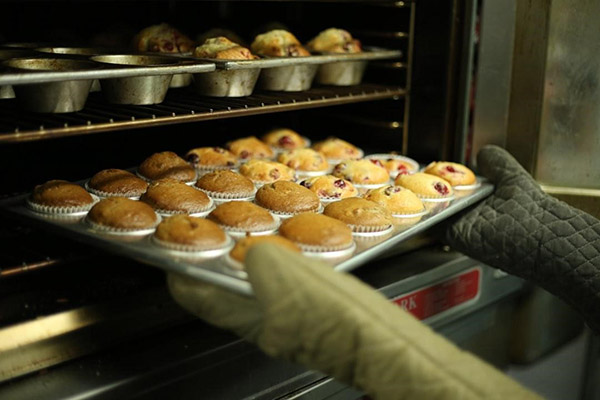- Assess your kitchen’s needs, considering the volume and type of food, available space, budget, and energy efficiency.
- Understand the different types of commercial ovens (convection, deck, conveyor, combi, cook-and-hold) and their ideal uses.
- Evaluate key features like temperature control, ease of cleaning, durability, and energy efficiency.
- Choose a quality brand with a good reputation, consult with experts, and test the oven before purchasing.
The commercial oven is the heart of the culinary operation. Whether you’re running a small bistro or a large dining establishment, having the right commercial oven can make all the difference in your kitchen’s efficiency and the quality of the dishes you serve. This guide aims to help restaurant owners navigate the complex market of commercial ovens and choose the one that perfectly fits their needs.
Understanding Your Kitchen’s Needs
Before diving into the different types of commercial ovens, it’s crucial to understand the specific needs of your kitchen. Start by assessing the volume and type of food you plan to serve. Are you baking pastries, roasting meats, or cooking pizzas? Each type of food may require a different kind of oven.
Consider the space and layout of your kitchen. Professional commercial ovens come in various sizes, and it’s essential to choose one that fits well within your available space without compromising workflow. Also, think about your budget and how important energy efficiency is to your operation. Investing in an energy-efficient oven might be more expensive upfront, but it can save you money in the long run through reduced utility bills.
Types of Commercial Ovens
There are several types of commercial ovens, each designed for specific cooking tasks. Understanding the differences between them can help you make a more informed decision.
Convection Ovens Convection ovens use fans to circulate hot air around the food, ensuring even cooking and browning. These ovens are incredibly versatile and are ideal for bakeries and restaurants with diverse menus. They are perfect for baking cookies, roasting vegetables, and cooking meats evenly.
Deck Ovens Deck ovens have stone or metal decks where the food is placed directly. These ovens are excellent for baking bread and pizzas because they provide a crispy crust. They are commonly found in pizzerias and bakeries, offering consistent and high-quality results.
Conveyor Ovens Conveyor ovens use a belt to move food through a heated chamber. These ovens are efficient for high-volume operations like fast-food chains and sandwich shops. They provide consistent cooking times and are great for foods like pizzas and toasted sandwiches.
Combi Ovens Combi ovens combine convection, steam, and sometimes microwave cooking to provide maximum versatility. They are ideal for high-end restaurants and versatile kitchens that need to prepare a variety of dishes quickly and efficiently. Combi ovens can bake, roast, steam, and even grill food, making them a valuable addition to any commercial kitchen.
Cook-and-Hold Ovens Cook-and-hold ovens slowly cook food and then hold it at serving temperature without drying it out. These ovens are perfect for catering services and buffet restaurants where food quality needs to be maintained over a long period.
Key Features to Consider
When choosing a commercial oven, consider several key features:
Temperature Control and Range Look for ovens with precise temperature controls and a wide temperature range. This allows for greater flexibility in cooking different types of food.
Ease of Cleaning and Maintenance Commercial ovens should be easy to clean and maintain. Look for features like removable racks and self-cleaning functions to save time and effort.
Durability and Warranty A good commercial oven should be built to last. Check the materials used in construction and look for warranties that offer peace of mind.
Energy Efficiency and Environmental Impact Energy-efficient ovens can significantly reduce operating costs. Look for ovens with energy-saving features and consider their environmental impact.
The Importance of Quality and Brand Reputation
When investing in a commercial oven, the quality and reputation of the brand are crucial. Trusted brands in the industry often provide reliable and durable ovens that perform consistently. Brands like Rational, Blodgett, and Vulcan are well-known for their high-quality commercial ovens.
Reading customer reviews and seeking professional recommendations can also provide valuable insights. Look for feedback from other restaurant owners and chefs who have experience with the ovens you are considering.
Making the Final Decision
After narrowing down your choices based on your kitchen’s needs and the features you require, it’s time to make the final decision. Consult with kitchen designers and chefs to get their expert opinions. They can provide insights into the practical aspects of using and maintaining different types of ovens.
If possible, test the oven before purchasing. Some suppliers offer demonstration kitchens where you can see the oven in action and evaluate its performance.
Conclusion
Choosing the right commercial oven for your restaurant is a significant decision that can impact your kitchen’s efficiency and the quality of your dishes. By understanding your kitchen’s needs, exploring different types of ovens, and considering key features, you can make an informed decision. Take your time, do your research, and consult with experts to find the perfect commercial oven that will help your restaurant thrive.
Investing in professional commercial ovens is a decision that pays off in the long run. The right oven can elevate your cooking, improve your kitchen’s workflow, and ultimately contribute to the success of your restaurant.



